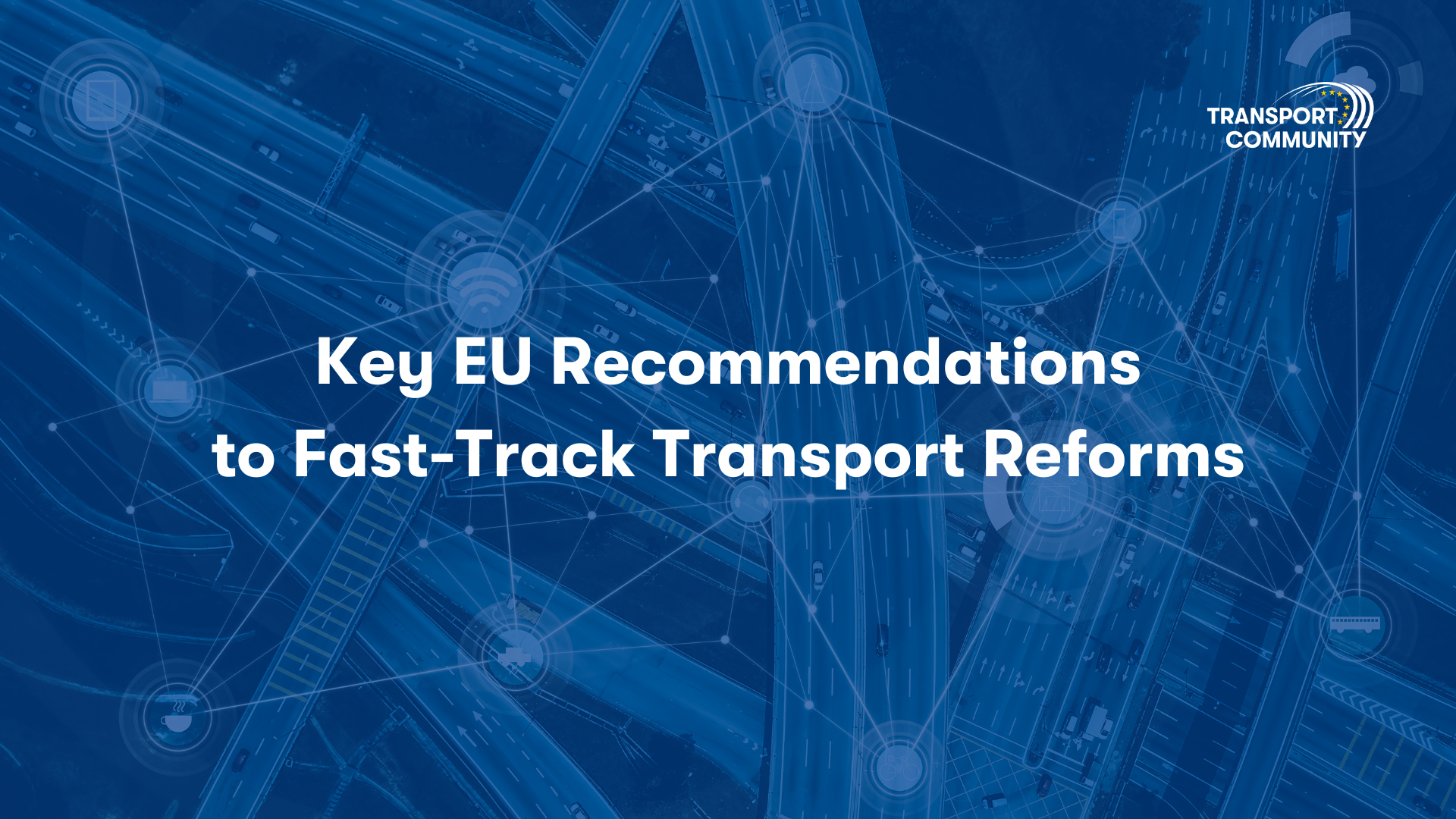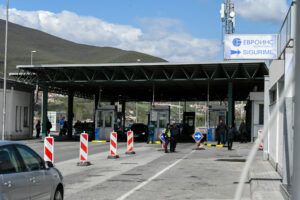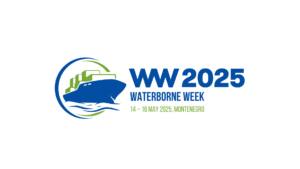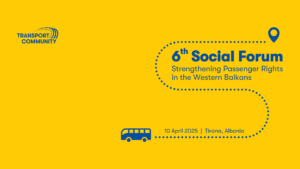BRUSSELS – The European Commission has adopted and published its annual Enlargement Package, providing a detailed assessment of the state of play and the progress made by Albania, Bosnia and Herzegovina, Kosovo*, Montenegro, North Macedonia, Serbia, Georgia, the Republic of Moldova, Ukraine, on their respective paths towards EU accession. The assessments are accompanied by recommendations and guidance on the reform priorities.
The Permanent Secretariat of the Transport Community brings to your attention the key highlights, outlining the major recommendations by the European Commission in the field of transport for each of our regional partners and observing participants, as per the published reports.
ALBANIA
Chapter 14: Transport policy
Albania has some level of preparation in the area of transport policy, with limited progress achieved in the reporting period. Albania adopted implementing legislation related to the rail sector and further measures to improve the quality and performance of the vessels sailing under the Albanian flag. The Commission’s recommendations from last year were partially implemented and remain mostly valid. In the coming year, Albania should in particular:
→ adopt the new transport strategy, and its accompanying action plan, and the new road safety strategy in line with the Transport Community road safety action plan;
→ implement legislation on the railway sector reform, in line with the Transport Community rail action plan;
→ continue to improve the performance of maritime transport vessels sailing under the Albanian flag.
Chapter 21: Trans-European networks
Albania has some level of preparation in trans-European networks. Some progress was made in developing transport and energy networks as work to prepare projects is ongoing. The Commission’s recommendations from last year were partially implemented and remain mostly valid. In the coming year, Albania should, in particular:
→ speed up the implementation of the TEN-T five-year workplan of the Transport Community Treaty and continue developing the core energy networks in line with the national strategies and infrastructure investment prioritisation, under the single project pipeline;
→ continue to align its legal framework with the EU acquis and the regulations on TEN-T (trans-European transport networks) and TEN-E (trans-European energy networks), including fully aligning guidelines for on trans-European energy infrastructure;
→ strengthen capacity for and ensure progress in implementing the Economic Investment Plan for the Western Balkans’ projects on transport and energy.
BOSNIA AND HERZEGOVINA
Chapter 14: Transport policy
Bosnia and Herzegovina has some level of preparation in the area, with no progress achieved in the reporting period. The Commission’s recommendations from last year were not implemented and therefore remain valid. In the coming year, Bosnia and Herzegovina should in particular:
→ establish a lead agency for road safety and a countrywide system to collect data on road crashes;
→ bolster the independence, strengthen the capacity and ensure sufficient funding of all bodies at state and entity level in the area of transport;
→ adopt a strategic framework and legislation to implement intelligent transport systems (ITS) on the core networks.
Chapter 21: Trans-European networks
Bosnia and Herzegovina has some level of preparation on trans-European networks. There was limited progress in this area, with the continuation of the Corridor Vc motorway development. The Commission’s recommendations from last year were only partially implemented and therefore remain valid. In the coming year, Bosnia and Herzegovina should in particular:
→ continue developing the planned extension of the TEN-T and TEN-E core networks in line with the identified priorities;
→ accelerate the implementation of connectivity reform measures and continue to regularly adopt amended multiannual maintenance plans for the road and rail core networks;
→ align the legislation with the EU acquis on guidelines for trans-European energy infrastructure.
KOSOVO
Chapter 14: Transport policy
Kosovo is at an early stage of preparation in the area and made some progress by adopting the action plan for the implementation of the multimodal transport strategy, approving the strategy on an intelligent transport system, and opening new air corridors with Albania. More action is needed to implement the EU acquis. Last year’s recommendations remain partly valid. The Commission’s recommendations from last year were partially implemented and remain largely valid. In the coming year, Kosovo should:
→ adopt the new Law on roads; invest in road maintenance and inspections; continue prevention campaigns; and set up a systematic monitoring mechanism for collecting crash data;
→ align its legal framework with the EU rail acquis, particularly the 4th railway package for both the market and technical pillar;
→ adopt the action plan for the intelligent transport system strategy and ensure sufficient capacity and resources are made available for its implementation; and harmonise the legislative framework with the EU passenger rights acquis across all modes of transport.
Chapter 21: Trans-European networks
Kosovo has some level of preparation in the area. Limited progress in this area was made by continuing works on Rail Route 10 and initiating the day-ahead electricity market coupling with Albania. The Commission’s recommendations from last year were partially addressed and remain largely valid. In the coming year, Kosovo should:
→ implement the pending connectivity projects; and strengthen its institutional and administrative capacity to implement strategic infrastructure projects;
→ proceed with the signalling works; and complete the first phase of Rail Route 10;
→ improve the capacity of the regulatory authority for electronic and postal communications to enforce telecommunications market regulations.
MONTENEGRO
Chapter 14: Transport policy
Montenegro is between moderate and a good level of preparation in this area. There was limited progress on key reforms, with the adoption of the new road safety strategy. The Commission’s recommendations from last year were only partially implemented and remain valid. In the coming year, Montenegro should in particular:
→ adopt a new railway law to ensure that fully functional, operationally independent and appropriately staffed railway regulatory body and railway safety authority are in place;
→ lay down the strategic Intelligent Transport System framework for the rail and maritime networks;
→ ensure full implementation, funding and monitoring of 2024-2030 road safety strategy.
Chapter 21: Trans-European networks
Montenegro is between a moderate and a good level of preparation in this area. There was no progress on key reforms.
The Commission’s recommendations from last year were not implemented and remain valid. In the coming year, Montenegro should in particular:
→ review its transport development strategy and align it with the strategy for sustainable and smart mobility in the Western Balkans, confirming a policy shift towards rail, multimodality and reducing CO2 emissions and other environmental impacts;
→ strengthen administrative capacity and develop institutional policies to hire and retain skilled staff to manage infrastructure projects in the areas of transport, telecommunications and energy; → revise institutional policies to improve decision-making on infrastructure projects and increase the capacity to absorb funding.
NORTH MACEDONIA
Chapter 14: Transport policy
North Macedonia is moderately prepared in the area of transport. Some progress was made in the reporting period, notably by adopting the new Law on aviation. The sector inspection bodies still lack administrative and operational capacity to improve. The Commission’s recommendations from last year were not fully implemented and therefore remain largely valid. In the coming year, North Macedonia should in particular:
→ ensure qualified operational and administrative capacity of the inspection bodies and develop their enforcement capacity to reduce accidents and fatalities in road and rail transport;
→ implement the connectivity reform measures for road and rail and finalise pending border-crossing agreements/protocols to facilitate the flow of traffic and goods;
→ adopt and implement legislation on multimodal and intelligent transport systems (ITS) for road and rail and on electronic freight transport information.
Chapter 21: Trans-European networks
North Macedonia has a good level of preparation in the area of trans-European networks. Limited progress was made during the reporting period. The Commission’s recommendations from last year were not implemented and therefore remain valid. In the coming year, North Macedonia should in particular:
→ strengthen the operational and technical capacity of all management and stakeholder institutions dealing with the development of both the Trans-European Transport (TEN-T) and Trans-European Energy (TEN-E) networks, harmonise the legal framework and increase compliance with the Trans-European Network Regulation;
→ mobilise sufficient resources to implement the goals and deadlines set out in the Transport Community’s five-year rolling work plan for the development of the TEN-T extension;
→ make the Railway Border-Crossing Protocol signed with Kosovo operational, finalise the mutual agreement for border crossings procedures with Greece, and accelerate progress on the construction and completion of the rail connection along Corridor VIII with Bulgaria
SERBIA
Chapter 14: Transport policy
Serbia has a good level of preparation in this field. Limited progress was made during the reporting period with the adoption of the Road Safety Strategy and its 3-year action plan. The Commission’s recommendations from last year were only partially implemented and remain largely valid. In the coming year, Serbia, should in particular:
→ adopt the national transport strategy; improve the maintenance system for road and rail infrastructure; align and simplify road and rail border crossing procedures, including the extension of green corridors/green lanes for crossings with neighbouring EU Member States; and implement measures in the action plan for the road safety strategy;
→ ensure that procurement procedures for projects follow the principles of transparency, equal treatment and open competition;
→ on rail reform, continue aligning legislation with the fourth railway package and adopt the Law on railway safety.
Chapter 21: Trans-European networks
Serbia is between a moderate and a good level of preparation in the area of trans-European networks. Overall, some progress was made, including starting construction of the Niš– Dimitrovgrad railway line and completing the construction of the gas interconnector with Bulgaria. The Commission’s recommendations from last year were partially implemented and remain largely valid. In the coming year, Serbia should in particular:
→ continue to improve its transport and energy infrastructure connections, ensuring quality and transparency in line with EU standards;
→ finalise the permitting process for the Serbia-Bulgaria gas interconnector and put it into operation; start construction of section III of the Trans-Balkan electricity corridor and continue project preparation for section IV between Serbia, Bosnia and Herzegovina and Montenegro;
→ conclude the project preparations and launch the procurement process for the works to modernise the railway sections on Corridor X from Belgrade to Niš.
GEORGIA
Chapter 14: Transport policy
Georgia has some level of preparation in terms of transport policy. There was some progress during the reporting period with the setting-up of the Road Safety Department and the regional Road Safety Observatory in February 2024, and alignment with the international transportation of goods and passengers regulations. Georgia needs to make additional efforts on road safety to reduce the high number of road accidents and fatalities. The Commission’s recommendations from last year were partly implemented. In the coming year, Georgia should in particular:
→ further align with the relevant EU acquis e.g. on the procedures for checks on the transport of dangerous goods by road or on the social and market rules for road transport;
→ improve the safety of its infrastructure (road construction and maintenance), as well as the safety of road users through proper enforcement and education and awareness-raising campaigns to reduce the currently high number of road accidents and fatalities;
→ complete the institutional framework (independent regulatory body and national investigation body) for rail transport.
Chapter 21: Trans-European networks
Georgia has some level of preparation in the area of trans-European networks. There was some progress during the reporting period, notably the implementation of trans-European transport network (TEN-T) projects (e.g the East-West Highway) and the finalisation of the Baku-Tbilisi-Kars railway. The legislative framework needs to be aligned with the regulations on the trans-European networks for transport and trans-European networks for energy to implement transport and energy projects. Georgia’s transport and energy infrastructures are insufficiently developed. The Commission’s recommendations from last year were partially implemented and remain valid. In the coming year, Georgia should in particular:
→ improve the performance of the rail and road networks in terms of quality, capacity and safety, taking into account the new requirements in the revised TEN-T regulation;
→ align with the Regulation on guidelines for trans-European energy infrastructure as adapted and adopted by the Decision of the Energy Community Ministerial Council in December 2023.
MOLDOVA
Chapter 14: Transport policy
Moldova has some level of preparation in transport policy. Some progress was made in the reporting period, notably with the adoption of the new Railway Code. The country needs to continue alignment with the EU acquis, on all modes of transport, and to implement the acquis effectively. The Commission’s recommendations from last year were partially implemented and remain valid. In the coming year, Moldova should in particular:
→ continue progress made to be removed from the blacklist of the Paris Memorandum of Understanding on Port State Control;
→ adopt the social and market rules for road transport;
→ develop and adopt a new road safety strategy based on the safe system approach.
Chapter 21: Trans-European networks
Moldova has some level of preparation in trans-European networks on transport and made some progress over the reporting period. The Commission’s recommendations from last year were partially implemented and remain valid. In the coming year, Moldova should in particular:
→ accelerate the implementation of infrastructure projects on Solidarity Lanes, in particular rehabilitating the north-south railway corridor as well as projects approved under the Connecting Europe Facility Calls of 2022 and 2023;
→ finalise the ongoing pre-feasibility and feasibility studies for the development of priority TENT road and rail corridors, notably for Chisinau ring road, Ungheni – Chisinau – Odesa road corridor, and Ungheni – Chisinau standard gauge rail connection;
→ speed up the strengthening of electricity interconnections, focusing on the completion of the Vulcanesti-Chisinau 400 kV overhead power line by end 2025 and make progress on BaltiSuceava 400 kV, paving the way towards its completion by end 2027 at the latest.
UKRAINE
Chapter 14: Transport policy
Ukraine has some level of preparation in the field of transport policy, with limited progress achieved. The Commission’s recommendations from last year were only partially implemented and remain valid. In the coming year, Ukraine should in particular:
→ adopt the Law on railway transport creating an institutional and legislative set-up for competitive rail market in line with EU standards and as required by the Ukraine Plan, and start preparatory work for a law amending certain legislative acts on merchant shipping and shipping on inland waterways;
→ adopt the revised National Transport Strategy 2030 and the Strategy for developing and expanding the border infrastructure with EU member states and the Republic of Moldova until 2030 in line with the Ukraine Plan, and start implementation;
→ adopt the social and market rules for road transport, strengthen administrative capacities and enforcement of the compliance with the haulage market rules and measures of traffic safety and establish inspection and investigation bodies for rail, road and inland waterways.
Chapter 21: Trans-European networks
Ukraine has some level of preparation in the field of TENs, with some progress achieved, related to energy trading with the EU. The Commission’s recommendations from last year were partially implemented and remain valid. In the coming year, Ukraine should in particular:
→ assess the potential for upgrades to critical energy and transport infrastructure, including with neighbouring countries, and plan those upgrades; ensure better connections with EU Member States through more efficient TEN-T rail and road border-crossing points;
→ further align with and implement the TEN-T- and TEN-E-related regulatory framework, including alignment with the new TEN-T and TEN-E Regulations and improvements to the permit-granting process for TEN-E projects;
→ develop administrative capacities and scale up project preparation to ensure that transport and energy infrastructure projects can be implemented in line with EU standards.
________________
*This designation is without prejudice to positions on status, and is in line with UNSCR 1244/1999 and the ICJ Opinion on the Kosovo declaration of independence.










